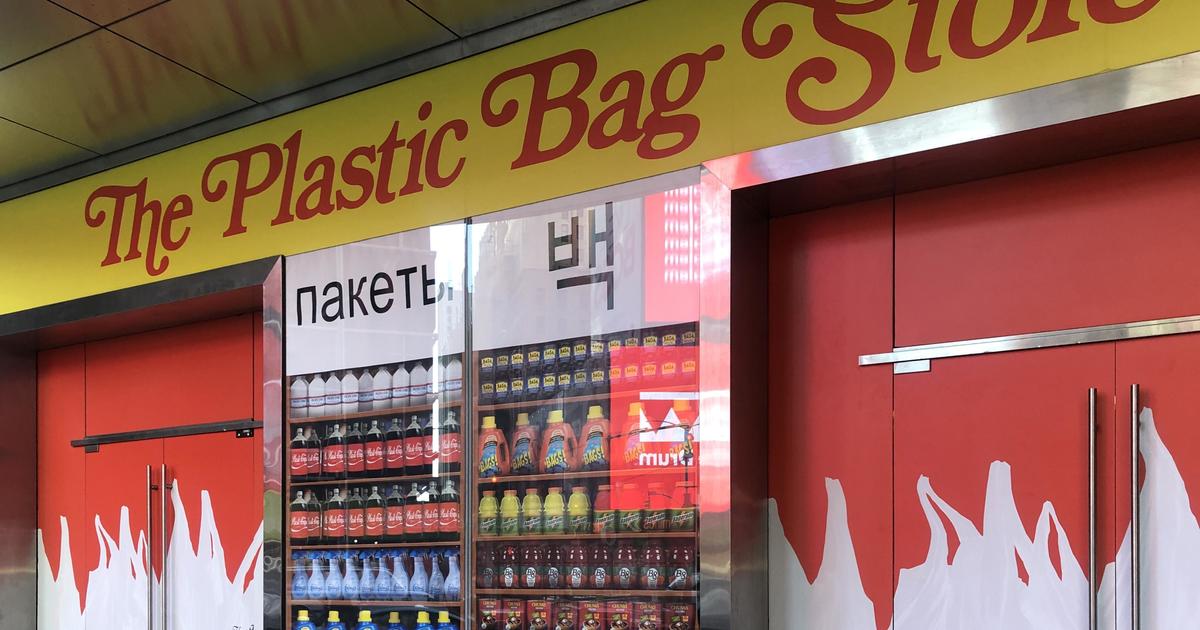In between the flashing lights, restaurants and retail stores that are iconic to Times Square, New Yorkers will soon be able to experience a new attraction. At first glance, it may look like a regular grocery store, but every single item in “The Plastic Bag Store” is made from — you guessed it — plastic.
From the vegetables to the deli meats, the store, which is located at 20 Times Square, is fully stocked with items made from discarded, single-use plastics. Attendees will experience plenty of surprises such as hidden rooms, a transforming set and a short film. The exhibit is the brainchild of Brooklyn-based artist Robin Frohardt and is presented by Times Square Arts.
“‘The Plastic Bag Store’ is a visually rich, tactile, and humorous experience that hopefully encourages a different way of thinking about the foreverness of plastic, the permanence of the disposable and that there is no ‘away’ when we throw something out,” said Frohardt.
“It is my attempt to make something authentic and human from that which is mass-produced. There is great humor to be found in the pitfalls of capitalism and I find that humor and satire can be powerful tools for social criticism, especially with issues that feel too sad and overwhelming to confront directly.”
A box of cereal inside “The Plastic Bag Store.”
Chevaz Clarke
Frohardt filled the store’s shelves with nearly 10,000 pieces of single-use plastic items, which she collected over the course of many years from friends, her building and things she found on the street.
According to the Center of Biological Diversity, Americans use around 100 billion plastic bags a year, and it was this excessive use that prompted Frohardt to draw attention to the problem. “I got the idea just in a regular grocery store watching someone bag and double bag and triple bag all of my groceries that we’re already inside of bags. It just struck me as incredibly absurd how much plastic packaging is being used,” said Frohardt, who spoke to CBS News from a room decorated with plastic bags.
“Most of this single-use plastic is designed for its convenience. And so, you use it for only seconds, and then you throw it away. So it’s out of sight out of mind. But because it doesn’t decompose, it doesn’t really go anywhere. It’s still here, it’s still somewhere. So that little red stir stick you stirred creamer into your coffee in a bank in 1995 is possibly floating out in the ocean somewhere,” said Frohardt. “So I just kind of wanted to, instead of throwing all this stuff away, just collect it and keep it in one place and sort of give people a sense of how much waste there is.”
Produce inside “The Plastic Bag Store.”
Chevaz Clarke
The exhibit’s opening coincides with New York’s ban on single-use plastic bags, which takes effect Monday. The order had been delayed due to the coronavirus pandemic. Seven other states across the nation have already banned single-use plastic bags, but Frohardt said more needs to be done.
“A lot of the solutions are going to have to come on a policy level, and it’s going to have to come from the people who are producing the plastic. But they’re not going to make those changes until there’s enough public outrage,” said Frohardt, who plans to travel with the exhibit in the future. “And I think that that’s growing, I think people are starting to understand more and more. It’s not that hard to imagine a world without plastic, because we did it for thousands of years.”
“The Plastic Bag Store” will open from October 22 to November 7. While you can’t purchase any of the items on display, the free exhibit requires advance reservations.
